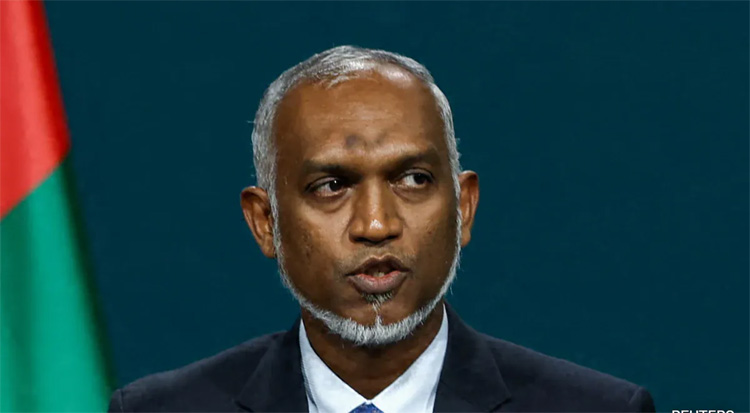Pro-China President Mohamed Muizzu’s Coalition Wins Maldives Parliamentary Elections
Maldives President Mohamed Muizzu’s ruling coalition scored a landslide victory in Sunday’s parliamentary election, securing an absolute majority in Parliament as voters appeared to back his government’s policy to align the Indian Ocean archipelago more closely with China.
The election result could further strain relations between the Maldives and India, already at a fresh low over Muizzu’s efforts to reduce the country’s dependence on New Delhi in areas ranging from defence to food security.
Results declared by the Maldives’ Election Commission and trends reported by the local media showed that Muizzu’s People’s National Congress (PNC) party and its allies, Maldives National Party (MNP) and Maldives Development Alliance (MDA), were set to win close to 70 seats or a “super majority” in the 93-member People’s Majlis or Parliament.
More than 284,000 voters were eligible to participate in the polls to choose the 93 members of Parliament for the next five years, and officials put the turnout at more than 73%.
The Maldivian Democratic Party (MDP), which lost last year’s presidential election and had followed an ‘India First’ policy, won less than a dozen seats – fewer than a fifth of the 65 seats it had in the outgoing Parliament.
In contrast, the PNC-led coalition had only eight seats in the outgoing Parliament, and the MDP often stymied the government by holding up the ratification of appointments to the cabinet and policy and spending decisions made by Muizzu.
Muizzu had projected the parliamentary election as a referendum on the policies of his government, with the PNC asking voters to elect a majority so that the government could swiftly fulfil his presidential campaign pledges, including a move to send back Indian military personnel deployed in the Maldives to operate two helicopters and an aircraft.
The outcome of the election reflected public support for Muizzu’s moves for closer security and economic cooperation with China. Amid campaigning for the parliamentary election, Muizzu awarded big ticket infrastructure projects to Chinese state-run firms.
Since coming to power last year, Muizzu has sought to shift the Maldives toward China and away from its longstanding ties with India. He has taken several steps to lessen the archipelago’s dependence on India for food security and healthcare, including signing contracts with Turkiye and other countries for supplying food items and pharmaceutical products.
Muizzu’s government has acquired drones from Turkiye to carry out surveillance of the country’s exclusive economic zone, effectively reducing dependence on India in this crucial sector. It also finalised an arrangement with Sri Lanka for emergency medical evacuations as part of measures to move away from India for cooperation in healthcare.
More than 80 Indian military personnel were stationed in the Maldives to operate the helicopters and aircraft used mainly for humanitarian relief operations and medical evacuations and two batches were withdrawn in March and April. All the military personnel are set to leave by May 10, and will be replaced by civilian experts.
Muizzu – who recently accused his predecessor Mohammed Ibrahim Solih of acting on the orders of a “foreign ambassador” in a thinly veiled dig at India – had also appealed to voters to give his coalition a majority in Parliament to protect the independence of the Maldives.
“All those who love our nation must make sure the decision they make tomorrow is one to secure our nation’s future,” he said at a rally on Saturday. “The ballot you cast tomorrow must be for national sovereignty and for the protection of our nation.”
Both India and China have wooed the Maldives as part of efforts to project influence across the Indian Ocean. Both countries have poured billions of dollars into major infrastructure and housing projects in the Maldives in recent years.

